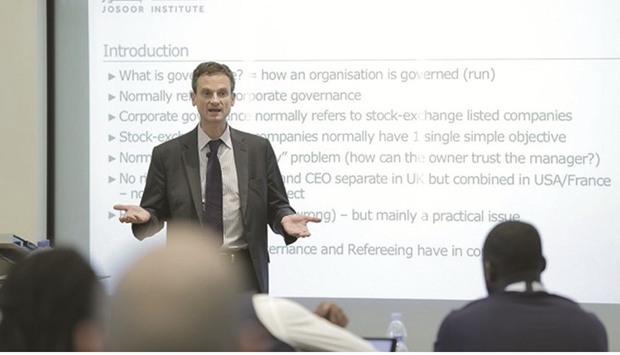A senior Asian Football Confederation (AFC) official has complimented a legacy initiative of the 2022 FIFA World Cup Qatar, saying the work of the Supreme Committee for Delivery & Legacy (SC)-supported Josoor Institute is helping to propel the professionalisation of football throughout the Middle East.
Alex Phillips, who is head of stakeholder affairs at the AFC – and currently seconded from his role as UEFA’s Head of Asia-Europe Affairs – believes that football has seen sweeping reforms towards professionalisation in many AFC member countries, specifically in East Asia and India.
He also said the work undertaken by Josoor Institute – the Doha-based centre for excellence in sports and events industries – will spearhead the process in the Middle East.
Josoor Institute was started in December 2013 to professionalise the sports and events industries of the MENA region through education, consultancy and research, and its inaugural batch of students graduated in 2016. Phillips hailed the Josoor Institute as an important legacy element of the 2022 FIFA World Cup Qatar.
“Education and knowledge building need time and it is very positive that Josoor Institute has started their work so well in advance rather than closer to 2022.
“Undoubtedly, the establishment of a professional workforce in the football industry in the Middle East will be an important 2022 legacy.”
Speaking to www.sc.qa on the sidelines of a recent Josoor Institute-organised professional management workshop on the business of football, Phillips also praised AFC member country, India, for its work towards building a legacy from staging a mega event, in the form of the FIFA Under-17 World Cup in October 2017.
“The different stakeholders of Indian football are making specific efforts to leave behind maximum legacy in different areas from the hosting of India’s first ever FIFA event,” he said.
“Matches will be staged in six Indian states, and grassroots participation from these areas is involved in the lead up to the tournament. The All India Football Federation is doing its best to ensure knowledge and ideas from the event are preserved and used in the future for the betterment of Indian football.”
Phillips shed light on how professionalisation will make a difference to the real stakeholders of Asian football – the fans. “Asian countries and clubs have realised in recent times that there is a direct correlation between improving results on the pitch and good governance off it,” said Phillips.
“Well-governed clubs and federations invariably do well on the pitch.”
Phillips concluded by emphasising the need for more regional centres like Josoor Institute across Asia as the continent seeks to gain global significance in football. “Asia is a huge continent and home to more than 60% of the world’s population,” he said.
“There cannot be one solution towards professionalising the whole of the continent. It is a sum total of many regions and countries having their own distinct business models.
“People learn by doing. The best European clubs are what they are because of well-informed, locally-driven decisions taken over 50 years. The same process is happening in Asia now and the results are already visible.” SC.qa

Head of stakeholder affairs at AFC Alex Phillips during a professional management workshop organised by Josoor Institute.
